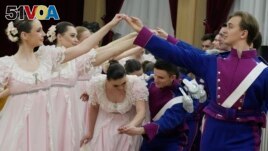The polonaise is a traditional Polish dance that was once banned in the country. Now, the United Nations is honoring the dance.
UNESCO stands for the United Nations Educational, Scientific, and Cultural Organization. On December 5, the polonaise entered UNESCO's List of Intangible Cultural Heritage. The U.N. organization noted that the dance "symbolizes cooperation, reconciliation, and equality."
The dance is believed to have started in the 18th century. It has been performed at parties for the rich and powerful and at village celebrations. The polonaise has inspired music by composers such as Johann Sebastian Bach and Frederic Chopin. And it remains an important part of school and family celebrations.

Dancers of the WARSZAWIANKA ensemble of the University of Warsaw dance Poland's national polonaise dance in 18th century costumes during dress rehearsal in Warsaw, Poland, on Feb. 8, 2024. (AP Photo/Czarek Sokolowski)
Poland's Ministry of Culture and National Heritage asked for the Polonaise to be included on UNESCO's list. The ministry said its request received huge public support.
"Thousands of people on Facebook and on other social media were supporting the (UNESCO) entry," Joanna Cicha-Kuczynska of the ministry's Department of Monuments Protection, told The Associated Press.
She said there is a huge community, including whole families, that dance the polonaise and pass the tradition on.
In the polonaise, a whole group can dance together, explained Marcin Pracki, a dancer of the Warsaw University's Dance Theater.
Another dancer, Monika Fiugajska, said the dance's simplicity is its strength. She added that the polonaise can express emotions in a special way.
The dance developed from a traditional form called the "walking dance." By the 18th century, it had become popular at royal European balls, or dance parties.
The word polonaise is French for "Polish."
Szymon Paczkowski is a musicology professor at the University of Warsaw. He agrees that the dance should be on UNESCO's list. "It is a dance with not only Polish but an international tradition," he said.
In the late 18th century, Russia, Prussia, and Austria divided and controlled Poland for more than 100 years. Russia banned the polonaise in the areas it took over.
During this time, the polonaise became an important connection to Poland for Polish people, especially those in foreign countries. This included Chopin, who left Poland in 1830 and moved to Paris the following year. Today, Chopin's polonaises remain among the most popular pieces for classical piano.
In Poland, the polonaise has now become the opening dance at high school pre-graduation balls. After World War II, Poland's communist officials banned it from schools. The officials worried about its connection to Polish patriotism and former rulers.
Nineteen-year-old Gabrysia Kosmal was among the students at one of Warsaw's high schools who performed the polonaise this month. She noted that although there are conflicts between students, when they dance the polonaise, they come together. "It's a magical moment," she said.
The polonaise is regularly performed during national anniversaries, including the November 11 Independence Day. On this day, people are invited to dance in the streets with officials.
Natalia Berna is an 18-year-old student who took part in a large street dance in the central city of Lodz last month. She said the polonaise brings people together at a time when the community needs it. She added that it is important to keep the tradition alive.
The leader of the Lodz street dance, Janusz Wielgosz, said the polonaise is about beauty.
"It is a dance that is really very simple, with beautiful music and beautiful costumes. It is worth a try," he said.
I'm Andrew Smith.
Monika Scislowska and Rafal Neidzielski reported this story for the Associated Press. Andrew Smith adapted it for VOA Learning English.
___________________________________________
Words in This Story
symbolize –v. to represent an idea or belief
reconciliation –n. the act of bringing people together to put aside their earlier differences or troubles
inspire –v. to cause people to want to do something or to be hopeful about the future
composer –n. a person whose job it is to write and arrange music
classical –adj. related to music and other art forms of a time period in Europe that embodied certain ideals believed to be from ancient times that were accepted and liked by educated people
costume –n. a kind of clothing that is different from things worn daily and is linked to cultural activities
